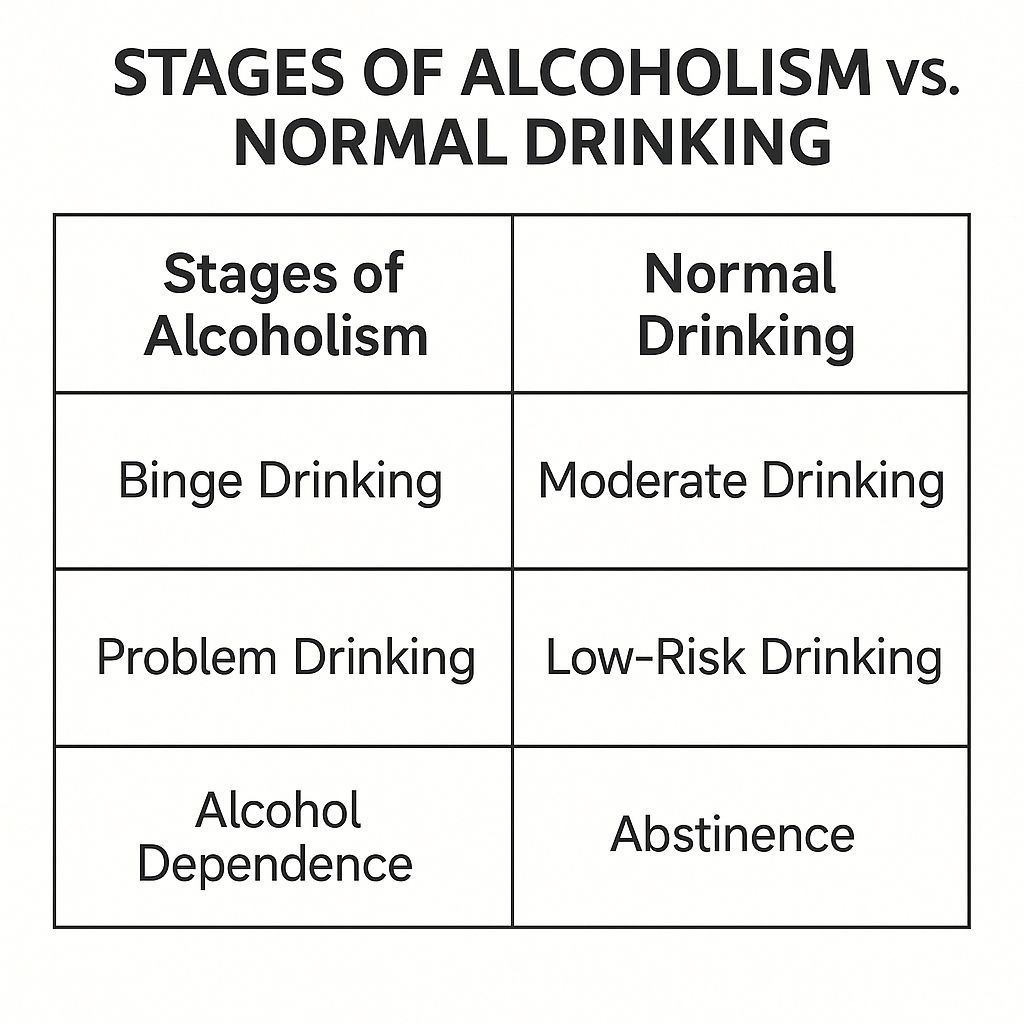Understanding the stages of alcoholism is crucial for recognizing the progression of alcohol dependence and knowing when to seek help. In this article, we will explore the different phases from initial casual drinking to severe addiction, highlighting key behaviors and symptoms at each stage.
Key Takeaways
- Alcoholism progresses through four stages: pre-alcoholic, early alcoholic, middle alcoholic, and late alcoholic, each with increasing severity of alcohol addiction.
- Early intervention is crucial and can improve recovery outcomes, with screening tools available to identify at-risk individuals.
- Treatment approaches vary by stage, focusing on prevention in early stages and intensive medical support in late stages to manage severe alcohol dependence.
What are the four stages of alcoholism?
The progression of alcoholism is categorized into four distinct phases, each marked by specific behavioral and physical changes:
- Pre-alcoholic stage
- Early alcoholic stage
- Middle alcoholic stage
- Late alcoholic stage
These theoretical stages represent a continuum of alcohol use disorder (AUD), from initial casual drinking to full-blown addiction, with increasing severity of alcohol dependence as the stages advance.

Pre-alcoholic stage
During the pre-alcoholic stage, individuals typically engage in occasional drinking socially, often using alcoholic beverages as a coping mechanism for emotional challenges without significant negative consequences. This stage is characterized by developing a tolerance to alcohol, as individuals drink alcohol to consume higher quantities to achieve the same effects.
People in the pre-alcoholic stage often do not recognize their drinking as problematic, leading to a gradual escalation in consumption.
Early alcoholic stage
In the early alcoholic stage:
- Drinking becomes more frequent.
- Individuals may start to rationalize their alcohol use, using it as a way to manage the repercussions of overindulgence.
- Binge drinking is common, involving consuming large amounts of alcohol in a short time.
- This behavior can heighten the risk of developing an alcohol use disorder.
This stage may see individuals exhibiting fewer than three criteria for alcohol use disorder as defined by the diagnostic and statistical manual (DSM-5), indicating early problematic drinking.
Middle alcoholic stage
This critical stage is characterized by increased alcohol consumption and noticeable changes in behavior, including potential conflicts in personal relationships and health issues. Individuals in the middle stage of alcoholism start to face serious repercussions such as job loss and strained personal relationships due to their usage, leading to the final stage of the condition.
Refraining from drinking can lead to physical withdrawal symptoms. Psychological withdrawal symptoms may also emerge. Responsibilities at home, work, and in relationships often start to be neglected as the addiction deepens.
Late alcoholic stage
The final phase signifies a complete loss of control over drinking, where physical dependence develops, leading to withdrawal symptoms when alcohol is not consumed. In the late phase of alcoholism, a person has developed a severe alcohol use disorder, significantly impairing their physical and mental health.
Late-stage alcoholism treatment often involves intensive medical care, including detoxification and possibly inpatient rehabilitation. Symptoms of late-stage alcoholism include severe withdrawal symptoms and an inability to control alcohol consumption, even with serious health risks.
How do the stages of alcoholism compare to normal drinking patterns?
The progression from casual drinking to alcohol dependence typically involves altered drinking habits and increased reliance on alcohol, which is later reflected in the alcohol recovery timeline during treatment. Regular drinkers may develop a reliance on alcohol that alters their social behaviors and responsibilities compared to casual drinkers.
Comparing the stages of alcoholism with normal drinking patterns highlights key behavioral, emotional, and physiological differences that are crucial for early detection and intervention.

Tolerance and volume consumed
One of the most noticeable differences between social drinkers and those progressing through the stages of alcoholism is the development of alcohol tolerance. Individuals may require larger amounts of alcohol to achieve the same effects as their tolerance increases over time.
Heavy drinkers often experience an increased tolerance, requiring higher quantities of alcohol to achieve the same effects over time due to repeated alcohol consumption and increased blood pressure.
Drinking motivations and frequency
Motivations for drinking can shift dramatically as one progresses through the stages of alcoholism. Social drinkers may enjoy alcohol for its pleasurable effects and social enhancement, whereas individuals with alcohol dependence may drink as a coping mechanism for stress or emotional challenges.
As dependency grows, drinking becomes more frequent and compulsive, often turning into obsessive drinking behavior. Many individuals seek ways to stop drinking and avoid excessive drinking to regain control over their lives through habit formation. They often explore various drinks that can help them in this journey, including strategies to address problem drinking and alcohol addiction.
Impact on life responsibilities
Dependence on alcohol often leads to neglect of personal, social, and professional responsibilities. As alcohol dependence progresses, individuals may face deteriorating relationships, job loss, and financial instability due to their drinking habits. Legal troubles can arise from alcohol-related incidents, further impacting responsibilities.
The compulsive nature of alcohol consumption can lead to significant neglect of essential duties related to work, home, and education due to impaired ability, alcohol misuse, and physical functions.
What are the symptoms of each alcoholism stage?
Symptoms of alcoholism vary by stage, influencing behavior, health, and social interactions. Recognizing these symptoms is crucial for early intervention and effective treatment.
Psychological symptoms
Psychological symptoms of alcoholism include:
- Denial
- Depression
- Mood swings
- Cravings
Individuals may experience severe mood swings and demonstrate irrational behavior, often driven by the compulsion to drink and the effects of withdrawal symptoms.
Over time, these psychological effects can lead to mental health issues such as anxiety, depression, and mental illnesses.
Physical symptoms
Common physical signs of alcohol dependence include changes in weight, sleep disturbances, and noticeable fatigue. Individuals may experience tremors, sweating, nausea, and changes in appetite. Chronic alcohol consumption can result in conditions such as fatty liver, hepatitis, and cirrhosis.
Withdrawal from alcohol can trigger alcohol withdrawal physical symptoms such as nausea, headaches, and tremors.
Social and functional symptoms
Socially, individuals may experience:
- Withdrawal from friends and family, impacting relationships and responsibilities
- Difficulties in maintaining work performance and family responsibilities due to alcohol use
- Increased secrecy about drinking habits, resulting in further alienation from friends and family
As alcohol dependence deepens, individuals might neglect personal hygiene and responsibilities, affecting their social interactions.
How does early intervention prevent progression?
Implementing early intervention strategies can significantly decrease the likelihood of developing severe substance use disorders. Detecting and treating alcoholism early can improve recovery outcomes and reduce health risks.
Effectiveness of early treatment
Early treatment for substance abuse can yield outcomes comparable to those for other chronic health conditions. Intervening early reduces the likelihood of long-term organ damage. About one-third of individuals receiving early treatment for alcoholism achieve sustained abstinence within the first year.
Screening tools and self-assessment
Screening tools for substance use can reliably identify individuals at risk, enabling timely and targeted interventions. The AUDIT (Alcohol Use Disorders Identification Test) is a widely recognized tool for identifying problematic alcohol use and assessing alcohol dependence.
The AUDIT questionnaire is a self-assessment tool with 10 questions evaluating alcohol consumption and its health implications.
How are treatments tailored to each alcoholism stage?
Treatment approaches differ across stages, focusing on specific needs and challenges unique to each phase of alcoholism. Effective treatment requires understanding the stage of alcoholism and using appropriate intervention strategies.
Pre- and early-stage treatment options
For those in the pre- and early stages, treatment often focuses on brief interventions, motivational interviewing, and outpatient counseling. These approaches address the underlying causes of alcohol use and prevent progression to more severe stages, encouraging individuals to enter treatment.
Middle-stage treatment options
Therapies during the middle stage often involve:
- Support groups and family therapy to address interpersonal issues caused by alcohol dependency.
- Medical detoxification to manage withdrawal symptoms.
- Outpatient rehabilitation programs to support recovery.
Late-stage treatment and medical detox
Late-stage treatment often requires medical detoxification to manage severe withdrawal symptoms and prevent complications. Late-stage treatment often includes medications to manage withdrawal and prevent complications such as delirium tremens.
Comprehensive care plans address co-occurring medical and psychological issues.
What long-term complications occur in late-stage alcoholism?
Chronic heavy drinking can lead to irreversible liver damage, including cirrhosis and liver disease. End-stage alcoholism can result in severe health complications, including major organ damage and potential organ failure.
Physical health risks
Chronic alcohol use damages the liver and increases the risk of cancer. Excessive alcohol consumption increases the likelihood of heart disease and strokes.
Long-term alcohol use can cause significant digestive issues like gastritis and pancreatitis.
Mental and emotional consequences
Chronic alcohol abuse can cause severe cognitive deficits, including memory loss and dementia. Prolonged alcohol dependence often leads to heightened feelings of depression and hopelessness.
Late-stage alcoholism can cause cognitive decline, including memory loss and confusion, often linked to conditions like alcoholic dementia and Wernicke-Korsakoff syndrome.
Can late-stage alcoholics recover fully?
Late-stage alcoholics can still achieve recovery, although it often requires intensive support and medical intervention. Late-stage alcoholics can achieve full recovery, but this often requires extensive treatment, commitment, and ongoing support.
Importance of medical and peer support
Medical and peer support provide necessary guidance and encouragement for individuals struggling with late-stage alcoholism. Peer support groups offer a sense of community and understanding, significantly enhancing motivation and commitment to sobriety.
Participation in peer support groups can lead to lower relapse rates and improved long-term recovery outcomes for those overcoming alcoholism.
Relapse prevention and accountability
Establishing a support system that emphasizes accountability is vital for preventing relapse among recovering individuals. Accountability through peer support helps maintain motivation and reduces the likelihood of relapse.
Family therapy can foster accountability by improving communication and establishing supportive relationships among family members involved in recovery.
Stages of alcoholism in teens: Is the pattern different?
Teens often exhibit different patterns of alcohol use compared to adults, with a tendency towards binge drinking and acute intoxication, early signs of teen alcohol abuse that require prompt intervention. Early alcohol exposure can accelerate progression and lead to quicker dependence in adolescents.
Unique risk factors in youth
Adolescents face unique challenges such as:
- Peer pressure
- Impulsive behavior
- Coexisting mental health issues
- Insufficient parental oversight
Their ongoing brain damage development can make them more vulnerable to alcohol-related issues, impacting decision-making and impulse control.
Early intervention in adolescent drinking
Implementing early preventive measures is crucial as starting alcohol consumption at a young age increases the risk of developing alcohol use disorders later in life. School-based prevention programs and family-based therapies can significantly reduce the risk of long-term alcohol dependence in teens.
Addressing substance use in adolescents early can significantly decrease the risk of enduring addiction problems.
When to seek help and how to start treatment
Many individuals struggling with alcohol use disorder (AUD) can improve their situation with appropriate treatment. Seeking help early in the progression of moderate aud alcoholism and severe aud is crucial for effective recovery and can significantly improve outcomes.
Recognizing warning signs
Common indicators of alcohol abuse include:
- Memory blackouts
- Mood swings, which often precede a formal diagnosis of alcohol use disorder
- Isolation from friends and family, as individuals may start drinking in secret to hide their behavior.
Seeking help promptly after recognizing early signs can greatly improve recovery outcomes.
Finding the right care
Professional treatment for alcoholism is recommended because detox can be dangerous, and withdrawal symptoms are best managed in a supervised environment. The National Institute NIAAA Alcohol Treatment Navigator helps individuals locate suitable treatment options for alcohol use disorder.
Recovery specialists provide personalized treatment plans addressing both the psychological and physical aspects of alcohol dependence.
Bottom Line: Alcoholism Stages
Understanding the stages of alcoholism is crucial for recognizing the signs early and taking appropriate action. Each stage presents unique challenges and requires specific interventions to prevent progression and promote recovery. By educating ourselves and those around us, we can better help someone with alcohol addiction and guide them toward treatment before the condition worsens. Remember, early intervention can save lives and improve the quality of life for those affected by alcoholism.
FAQs about alcoholism stages
How fast can someone go through the stages of alcoholism?
Progression through the stages of alcoholism can take months or even years, influenced by individual circumstances and drinking habits. It's essential to recognize that this process is highly personal and can vary widely among individuals.
Is it possible to skip a stage in alcoholism?
Yes, it is possible for some individuals to skip stages in alcoholism and move directly from mild to severe dependence due to their unique drinking behaviors and circumstances.
What are common warning signs of alcohol abuse?
Common warning signs of alcohol abuse include memory blackouts, mood swings, isolation from loved ones, and secretive drinking habits. Recognizing these signs early is crucial for seeking help.
What are effective early intervention strategies for alcoholism?
Effective early intervention strategies for alcoholism encompass brief interventions, motivational interviewing, outpatient counseling, and the utilization of screening tools such as the AUDIT to identify and address problematic drinking patterns before they escalate into dependence.
What are the long-term complications of late-stage alcoholism?
Long-term complications of late-stage alcoholism encompass irreversible liver damage, cognitive decline, severe mental health disorders, and heightened risk of major organ failure. These effects underline the serious consequences of prolonged alcohol abuse.
















